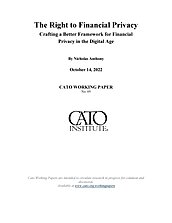Financial privacy in the United States has been in disrepair for over 50 years, and it’s getting worse. Not only are decades-old beliefs (e.g., the third-party doctrine) outdated for the digital age, but the merits of those beliefs are also highly questionable. Efforts, both new and old, to surveil and collect data on American’s financial activity show that now is time to craft a better framework for financial privacy. But Congress may not need to look far for ideas on how to protect American’s financial privacy.
The Right to Financial Privacy Act, originally enacted in 1978 in response to how the Bank Secrecy Act and the third-party doctrine weakened the protections of the Fourth Amendment, has already set a foundation for some of the protections needed today. However, it is largely due to a long list of exceptions for law enforcement and other government agencies in the Right to Financial Privacy Act that much of the financial surveillance over the past 50 years has not only been permitted to occur away from the public eye, but also to expand.
Part of the challenge is due to the fact that the “right to financial privacy goes to the heart of the tension between an individual’s right to conduct [his or her] business without governmental intrusion and the government’s legitimate need for information in law enforcement.”2 But striking this balance is not an insurmountable task. While critics point to curbing criminal activity to justify invading the public’s financial privacy,3 there should be stronger protections so long as the U.S. justice system maintains that the public is innocent until proven guilty. Neither fishing expeditions nor thread pulling that may lead to investigations should be considered a sound justification when financial information can reveal a person’s relationships, profession, religion, political leanings, locations, and so much more.4 Law enforcement still has a role to play in a future with stronger financial privacy protections, but that role would be, and should be, restricted by the Fourth Amendment to the Constitution.
To restore Americans’ financial privacy, Congress should amend the Right to Financial Privacy Act to remove the list of exceptions to its protections. Removing the exceptions will not bar law enforcement and other government agencies from access to financial information. Instead, it will merely require that government agencies acquire a warrant through the judicial process. During the last few years, Americans have seen time and time again how financial privacy can be violated by unchecked government authorities. 5 Now is the time to establish the protections that should have been in place from the beginning, and especially now amidst the digital age.

